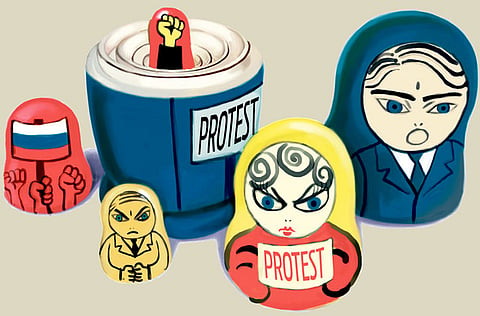The birth of citizenry marks Russia's moment of truth
The recent protest demonstration shows that the old social contract cannot become an indefinite right to rule

It was a moment Russians had waited for many years. On December 10, tens of thousands of middle class Russians came out to demonstrate their indignation — not only at fraud in the December 4 Duma election, but also at being treated with contempt by their rulers. The biggest protests since the early 1990s marked not a revolution, but a transformation of the middle class from consumers to citizens.
For a decade, middle class Muscovites pursued their careers, sipped coffee in cafes, read glossy magazines, shopped in Ikea and travelled abroad, allowing Vladimir Putin to consolidate power. Now they want the state's respect as successful citizens whose votes have been stolen by the ruling United Russia party. There was anger, but no aggression, even though the crowds included liberals, communists, anarchists and even some nationalists.
Some carried white flowers and wore white ribbons that Putin later said reminded him of condoms. When the rallies ended without a single arrest, there was a feeling of euphoria. The protesters had chanted "Russia", just as Putin had recently encouraged United Russia's members to do.
The rallies also differed from previous opposition protests that rarely gathered more than a few hundred people, but have always been brutally dispersed. Although the speakers on December 10 included Boris Nemtsov and Vladimir Ryzhkov, two opposition leaders, the main demands were not political: the removal of Vladimir Churov, head of the electoral commission, the release of political activists, registration of all political parties and fair elections.
Unlike the 1980s, the protesters are not looking for a leader, but for new rules for politics. They were mobilised by social networks rather than political parties. A key figure was Alexei Navalny, a popular blogger, who has used social networking to shake the Kremlin's power and undermine United Russia. Although Navalny is recognised by only 7 per cent of the population, his image of United Russia as a "party of crooks and thieves" is now recognised by more than two-thirds.
Navalny identified two key themes: corruption and nationalism (mainly an anti-Caucasus kind). He circumvented the state monopoly on television by appealing to an internet audience. A lawyer by training, he bought shares in several state monopolies and started demanding full disclosure. He has launched a hugely popular website exposing corrupt government tenders. But he also appeals to nationalists. "I consider myself to be a nationalist democrat," he says. When the official election results showed United Russia with 99 per cent of the votes in the three Caucasus republics, Navalny said Putin would now be president of Chechnya, Dagestan and Ingushetia, but not Russia.
Fraudulent election
The fraudulent election has turned Navalny's virtual status into a real political factor. After addressing a crowd of some 5,000 on December 5, he clashed with the police and was jailed for 15 days. His arrest, however, was one catalyst for the 50,000-strong peaceful demonstration five days later.
By the time of the next protest on December 24, Navalny should be out of jail. Yet, as Mikhail Dmitriev of the Centre of Strategic Research argues, the protesters already show a preference for networks over parties or leaders.
The Kremlin is trying to sit out the protests, hoping that they will dissipate into the holiday period. But a social shift looks to be under way. The old social contract, with a weak, passive middle class enriching itself while staying out of politics, cannot become an indefinite right to rule.
A decade of economic growth has made Russia's middle class more numerous and more active. It now accounts for some 20-25 per cent of the population, says Dmitriev. Having reached a Western level of consumption, it wants respect, independent courts, lawful police, good health care and education and intelligent television. It is tired of Putin and seeks genuine political representation. A feeble attempt to give it a political voice through the Right Cause party was thwarted when Mikhail Prokhorov, a rich oligarch chosen as a supine party leader, tried to assert his independence and was dumped. Putin's September announcement of a planned job swap with President Dmitry Medvedev seemed just another sign of regress and conceit.
Belatedly, the Kremlin is trying to repair the damage. Last week, Putin suggested installing television cameras in all polling stations for the presidential election in March. Prokhorov has now been allowed to register as a presidential candidate. And Putin called Alexei Kudrin, who had resigned as finance minister after the job-swap announcement and offered help to the liberal opposition, as part of his team.
The Kremlin's attempt to fake competition and engineer artificial parties can no longer work, since it was this imitation of a political process that caused the crisis.
To retain some legitimacy, Putin must now satisfy some of the protesters' demands. Last week, he sacrificed Boris Gryzlov as United Russia's parliamentary speaker. Perhaps he might pick Kudrin or Prokhorov as his prime minister, instead of Medvedev. If he does nothing, the protests may just keep growing.
Sign up for the Daily Briefing
Get the latest news and updates straight to your inbox



